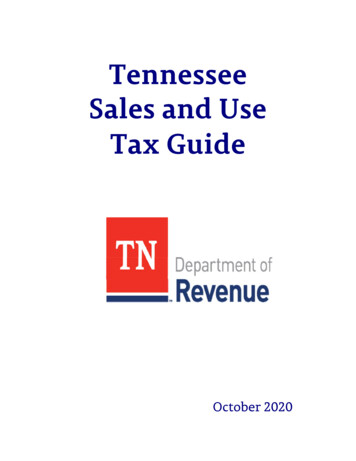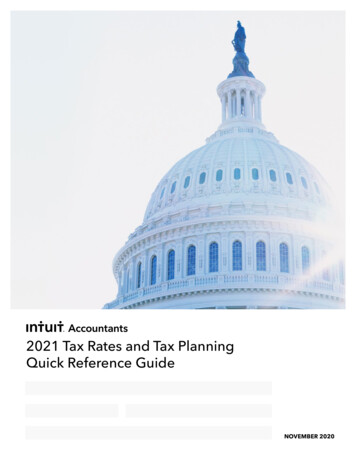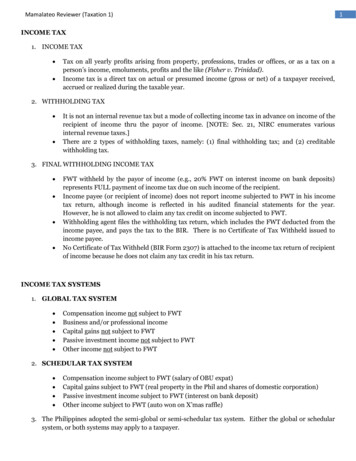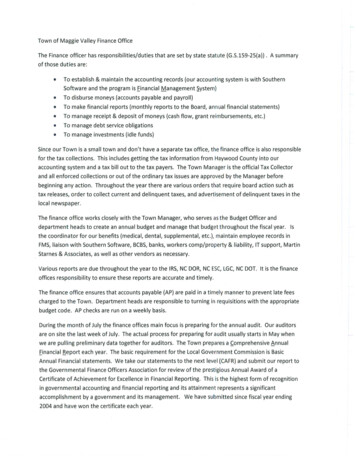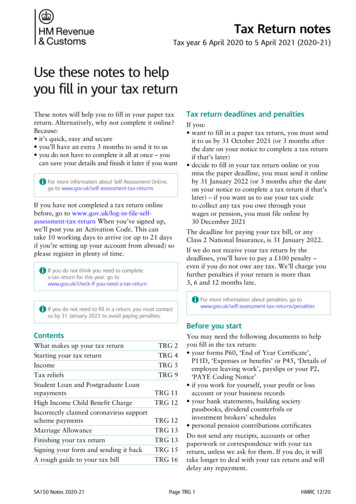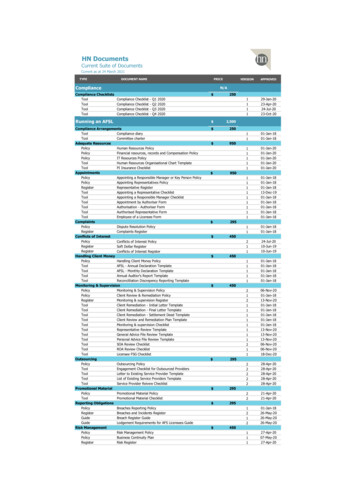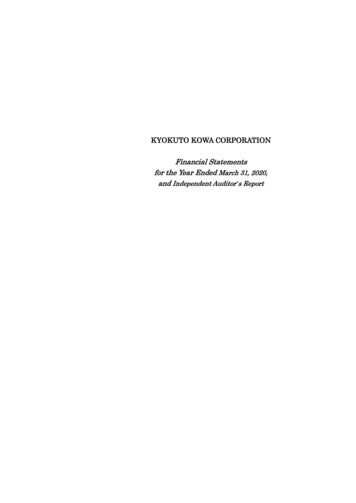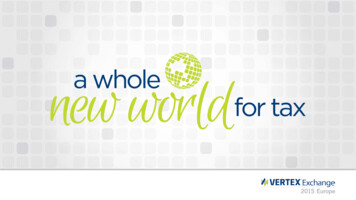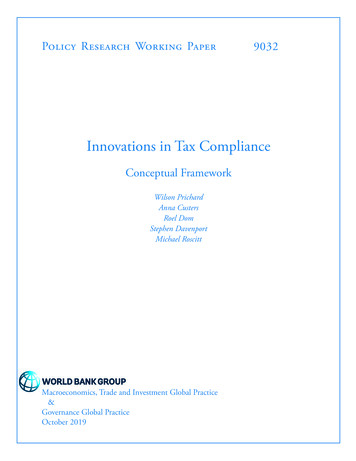
Transcription
Policy Research Working Paper9032Innovations in Tax ComplianceConceptual FrameworkWilson PrichardAnna CustersRoel DomStephen DavenportMichael RoscittMacroeconomics, Trade and Investment Global Practice&Governance Global PracticeOctober 2019
Policy Research Working Paper 9032AbstractThis paper presents a conceptual framework for developingmore effective approaches to tax reform and compliance.The framework proposes that by combining complementary investments in enforcement, facilitation, and trust,reformers can not only strengthen enforced compliancebut can also (a) encourage quasi-voluntary compliance,(b) generate sustainable political support for reform, and(c) create conditions that are more conducive to the construction of stronger fiscal contracts. A key challenge forgovernments lies in finding the right combination of thesethree measures—enforcement, facilitation, and trust—to achieve revenue and broader development goals. Theframework proposes greater reliance on locally groundedbinding constraints analysis, coupled with careful attention to understanding politics and the drivers of trust inparticular contexts, to guide analysis of how best differentinvestments may be combined, prioritized, or sequenced.This framework can help policy makers to think about theright combination of strategies in specific contexts, andthus to allocate resources most effectively.This paper is a joint product of the Macroeconomics, Trade and Investment Global Practice and the Governance GlobalPractice. It is part of a larger effort by the World Bank to provide open access to its research and make a contribution todevelopment policy discussions around the world. Policy Research Working Papers are also posted on the Web at http://www.worldbank.org/prwp. The authors may be contacted at acusters@worldbank.org and sdavenport@worldbank.org.The Policy Research Working Paper Series disseminates the findings of work in progress to encourage the exchange of ideas about developmentissues. An objective of the series is to get the findings out quickly, even if the presentations are less than fully polished. The papers carry thenames of the authors and should be cited accordingly. The findings, interpretations, and conclusions expressed in this paper are entirely thoseof the authors. They do not necessarily represent the views of the International Bank for Reconstruction and Development/World Bank andits affiliated organizations, or those of the Executive Directors of the World Bank or the governments they represent.Produced by the Research Support Team
Innovations in Tax ComplianceConceptual FrameworkWilson Prichard, Anna Custers, Roel Dom, Stephen Davenport and Michael RoscittJEL: H26, P16, D73Keywords: Tax compliance, political economy, trust, policy reform.
TABLE OF CONTENTSINTRODUCTION . 2CONCEPTUAL FRAMEWORK . 11ELEMENTS OF THE FRAMEWORK: ENFORCEMENT, FACILITATION, TRUST . 16Enforcement .16Facilitation .20Trust .23Fairness .28Equity .31Reciprocity .34Accountability.39TAILORING REFORM: COMBINING ENFORCEMENT, FACILITATION AND TRUST TOSTRENGTHEN FISCAL CONTRACTS . 40Social Desirability: What are the central objectives of reform?.41Technical Appropriateness: What are the binding constraints on reform? .42Political Feasibility: What are the key political barriers to reform? .43Building Fiscal Contracts: How can investments in enforcement, facilitation and trust best be combined? .451
INTRODUCTIONQuestions of how to effectively reform and strengthen tax systems have moved to the center ofdevelopment debates. On one hand, there is an opportunity to build on the successes of tax reformefforts in recent decades. Across much of the developing world, countries have achievedsignificant administrative and policy modernization, and meaningful improvements in revenuemobilization. On the other hand, successes have been uneven, and major challenges remain. Taxrevenue in many countries remains well below the levels needed to finance the achievement of thesustainable development goals, with 15 percent of GDP often cited as a rough annual target (Figure1). 1 Meanwhile, revenue collection is frequently characterized by significant unfairness andinequity, with particularly weak compliance and enforcement among the rich, and often significant– though overlooked – formal and informal burdens on lower income groups. 2Figure 1: Total Non-Resource Tax Collection by Region, 1990-2016 (% of ASA2015SSASource: International Centre for Tax and Development/UNU-WIDER Government Revenue DatasetObservers have questioned whether recent improvements in revenue collection have contributedto the construction of broader “fiscal contracts”. Revenue collection is not an end in itself. It onlybecomes socially desirable if it is translated into efficient and effective spending by governments.There is now extensive research documenting the ways in which the expansion of taxation mayspur greater accountability and contribute to state building. Yet the research makes clear that while1 Gaspar, V., Jaramillo, L and Wingender, P. (2016) Tax capacity and growth: is there a tipping point? IMF Working paperWP/16/234. Washington DC: International Monetary Fund.2 Moore, M., & Prichard, W. (2017). How can governments of low income countries collect more tax revenue? ICTD WorkingPaper 70. Brighton: International Centre for Tax and Development.2
there have been real success stories, a strong connection between taxation, responsiveness,accountability and state building is far from guaranteed. 3 Questions remain about whether currentreform efforts have focused sufficiently on fostering broader development gains. 4The limited focus on building fiscal contracts is evident in scant fiscal redistribution in many lowincome countries and correspondingly limited trust in tax systems. OECD data point toward farlower levels of fiscal redistribution among new members from the Global South. 5 Looking moredeeply, while simulation estimates are inevitably imperfect, the Commitment to Equity Institutehas sought to estimate total fiscal redistribution through taxes and direct transfers at the countrylevel. The pattern is striking: while middle-income countries sometimes achieve significantreductions in extreme poverty, this is not the case for lower-income countries, where direct fiscalredistribution is limited by heavy reliance on indirect taxes and weak transfer systems (Figure 2).While the impact of taxes on poverty reduction likely looks more encouraging when the in-kindvalue of all public services funded by government revenues is considered, there remains ampleevidence that service delivery targeting the poor is frequently ineffective. 6 Unsurprisingly,evidence of inequitable tax burdens and poor translation of revenue into services is reflected inlimited trust in tax systems in much of the low-income world (Figure 3).Figure 2: Estimated Reductions in Extreme Poverty from Taxes and Transfers20%0%-20%-40%-60%-80%-100%Notes: The poverty line is defined as 1.9 PPP/day. Positive values imply an increase in extreme poverty after taxes andtransfers.Source: Jellema, Lustig, and Papelbon (forthcoming). 7Prichard, W. (2015). Taxation, responsiveness and accountability in developing countries: The dynamics of tax bargaining.Cambridge: Cambridge University Press.4 Ibid; Prichard, W. (2016). What have we learned about taxation, state building, and accountability? ICTD Summary Brief 4.Brighton: International Centre for Tax and Development.; Prichard, W. (2010). Taxation and state building: Toward a governancefocused tax reform agenda. IDS Working Paper 341. Brighton: Institute of Development Studies.5 OECD (2019). Income inequality (indicator). doi: 10.1787/459aa7f1-en (Accessed on 14 June 2019).6 Hirvonen, K., Mascagni, G., & Keetie Roelen. (2018). Linking taxation and social protection: Evidence on redistribution andpoverty reduction in Ethiopia. International Social Security Review, 71(1), 3-24.7 Lustig, N., Jellema, J., & Martinez Pabon, V. (Forthcoming). Leaving No One Behind: Can Tax-funded Transfer ProgramsProvide Income Floors in Sub-Saharan Africa? in Kharas, H and McArthur, J. (Eds.). Leave No OneBehind. Washington: Brookings Institution Press.33
Figure 3: Trust in the Tax Department (% of tswanaBurkina FasoBurundiCameroonCape VerdeCôte d igerNigeriaSao Tome and PrincipeSenegalSierra LeoneSouth aZimbabwe0%SomewhatA lotNotes: Respondents were asked: “How much do you trust each of the following, or haven’t you heard enough about them to say:The tax department?” (% who say “Somewhat” and “A lot”). Afrobarometer R6 2014/2015 (Algeria, Benin, Botswana, BurkinaFaso, Burundi, Cameroon, Cape Verde, Côte d Ivoire, Egypt, Gabon, Ghana, Guinea, Kenya, Lesotho, Liberia, Madagascar,Malawi, Mali, Mauritius, Morocco, Mozambique, Namibia, Niger, Nigeria, Sao Tome and Principe, Senegal, Sierra Leone, SouthAfrica, Sudan, Swaziland, Tanzania, Togo, Tunisia, Uganda, Zambia, Zimbabwe). Source: Isbell (2017) based on Afrobarometer.The central challenge facing reformers lies in identifying innovative strategies to strengthenrevenue mobilization, trust, and fiscal contracts. Recent research points toward potential elementsof a strategy to strengthen the links between revenues and public benefits, including a greateremphasis on building trust and tax morale among taxpayers, expanded attention to the politicalchallenges of reform, efforts to better tailor reform to local contexts and needs, and clearer focuson empowering taxpayers. However, these strands of research have been somewhat fragmented,and have yet to be consistently applied in practice or translated into an overarching vision forreform.The Innovations in Tax Compliance project develops an integrated framework to expand ourunderstanding of more effective approaches to tax reform. This is best understood not as an effortto fundamentally rethink what we know about tax reform, but, rather, to provide a coherentframework for tax reform by bringing together – and consistently operationalizing – recentresearch on the drivers of tax compliance, trust and fiscal contracts, with lessons from the field.Traditionally, approaches to reform have stressed the importance of technical measures tostrengthen enforcement and, more recently, facilitate tax compliance. This focus has reflected earlymodels of tax compliance, which presented the decision to comply as the product of a rationaleconomic calculus: a taxpayer’s decision to comply is a function of the perceived probability ofan audit, the extent of penalties, and a taxpayer’s risk aversion. Stronger detection and higher4
penalties were thus the keys to inducing compliance. 8 Over time these models came to becomplemented by an expanded focus on facilitating tax compliance, recognizing that taxpayerswere more likely to comply when doing so was straightforward and low cost, thus shifting therational economic calculus in favor of compliance. 9This focus on enforcement and facilitation has underpinned a range of desirable reforms across thedeveloping world, along with modest, but consistent, revenue gains. Efforts to strengthenenforcement have included investments in building expanded assessment and audit capacities, newIT systems designed to reduce the scope for avoidance, improved collection methods, efforts toexpand access to third-party information, and policy changes designed to reduce the scope forevasion. 10 Meanwhile, efforts to facilitate compliance – and emphasize “customer service” – havecorrespondingly sought, among other aims: (a) to simplify tax systems, and related reportingrequirements; (b) to provide easy access to information about tax liabilities; (c) to provide accessto support and advice; (d) to provide simple methods for making tax payments, including online,at banks and via SMS; and (e) to reduce face-to-face interactions with tax collectors, which havehistorically caused delays and increased the risk of abuses. 11 The priority given to these issues isreflected, for example, in the World Bank’s Doing Business surveys, which track the difficulty oftax compliance for businesses. 12 Finally, reform efforts have not only targeted tax payers, but alsosought to improve the effort and performance of tax officials, in order to reduce collusion,corruption and simple shirking. These have included pay increases, performance contracts,increased monitoring, efforts to reduce opportunities for corruption and collusion, and a broademphasis on strengthening the “customer orientation” of tax administrations. 13However, despite important successes, efforts to strengthen enforcement and facilitation have notbeen sufficient to deliver more effective, equitable and accountable tax systems. The taxation ofthe wealthy remains highly ineffective in much of the developing world, with collection ofpersonal income taxes at only about a quarter of the levels found in OECD countries – thisrepresents the largest gap in comparative revenue mobilization (Figure 4). Subnational tax systemsgenerally fail to generate significant revenues, especially from property taxes, while in areas ofweak governance there is mounting evidence of heavy burdens on lower income groups createdby user fees and demands for informal payments. 14 While value-added taxes have been hailed as8 Cummings, Ronald, G., Martinez-Vazquez, J., McKee, M., & Torgler, B. (2009). Tax morale affects tax compliance: Evidencefrom surveys and artefactual field experiment. Field Experiments in Economics, 70 (3):447-457.9 Alm, J., Cherry, T., Jones, M., & McKee, M. (2010). Taxpayer information assistance services and tax compliance behavior.Journal of Economic Psychology, 31 (4):577-586; Alm, J. & Torgler, B. (2011). Do ethics matter? Tax compliance and morality.Journal of Business Ethics, 101:635-651.10 Slemrod, J. (2018). Tax compliance and enforcement. NBER Working Paper No. 24799. National Bureau of Economic Research.11 Fjeldstad, O.-H. & Moore, M. (2008). Tax reform and state building in a globalized world, in D. Brautigam, O.-H. Fjeldstad &M. Moore, (Eds), Capacity and Consent: taxation and state building in developing countries. Cambridge: Cambridge UniversityPress, 235–60.12 World Bank & PwC. (2018). Paying taxes 2019: Fourteen years of data and analysis of tax systems in 190 economies: How istechnology affecting tax administration and policy? Washington: The World Bank.13 Mookherjee, D. (1998). Incentive reforms in developing country bureaucracies: lessons from tax administration. Annual WorldBank Conference on Development Economics 1997, Washington: World Bank, 103-138; Fjeldstad, O. H. (2003). Fighting fiscalcorruption: lessons from the Tanzania Revenue Authority. Public Administration and Development: The International Journal ofManagement Research and Practice, 23(2), 165-175; Raballand, G., Chalendard, C., Fernandes, A., Mattoo, A., Rijkers, B., (2017).Customs Reform and Performance Contracts: Early Results from Madagascar. Governance Notes, No. 2.14 Bird, R. (2011). Subnational taxation in developing countries: A Review of the Literature. Journal of International Commerce,Economics and Policy, 2 (1):139-161; Franzsen, R., & McCluskey, W. (2017). Property tax in Africa: Status, challenges and5
a relative success, in lower-income countries their performance has still lagged behindexpectations, with c-efficiency ratios (which measure collection relative to potential) in Africa farbelow other regions (Figure 5). 15 Corporate tax collection continues to be plagued by extensiveand poorly managed exemptions, despite decades of international pressure for enhancedtransparency, and recent estimates suggest that revenue losses as a result of international taxevasion and avoidance are larger as a share of GDP in developing countries than in OECD memberstates. 16 Meanwhile, institutional reforms aimed at strengthening IT systems, 17 limiting politicalinterference, reducing corruption, 18 and improving transparency and expanding engagement 19have frequently underperformed. Finally, surveys reveal that trust in tax systems remains sharplylimited, undermining compliance and the potential for constructing broader political support forreform (Figure 3, above). 20Figure 4: Composition of tax revenue in developing and OECD countries, 1990-2016Developing CountriesOECD Countries2525202015151010550199019952000Trade Tax2005GST2010CIT019902015PIT19952000Trade Tax2005GSTCIT20102015PITSource: ICTD /UNU-WIDER Government Revenue Datasetprospects. Cambridge, MA: Lincoln Institute for Land Policy; van den Boogaard, V., Prichard, W., & Jibao, S. (2018). Informaltaxation in Sierra Leone: Magnitudes, perceptions and implications. African Affairs 118(471): 259–284.15 Keen, M. (2013). The anatomy of the VAT. IMF Working Paper 13/111. Washington: International Monetary Fund.16 Cobham, A., & Jansky, P. (2017). Global distribution of revenue loss from tax avoidance: Re-estimation and country results.WIDER Working Paper, no. 2017/55. Helsinki: United Nations University World Institute for Development Economics Research.17 Bird, R., & Zolt, E. (2008). Technology and taxation in developing countries: From hand to mouse. National Tax Journal, 4(2):791-821.18 Ahlerup, P., Baskaran, T., & Bigsten, R. (2015). Tax innovations and public revenues in Sub-Saharan Africa. Journal ofDevelopment Studies, 51(6): 689-706; Dom, R. (2019). Semi-autonomous revenue authorities in Sub-Saharan Africa: Silver bulletor white elephant. The Journal of Development Studies, 55(7), 1418-143519 Moore, M. (2014). Revenue reform and state building in Anglophone Africa. World Development, 60: 99-112.20 Aiko, R., & Logan, C. (2014). Africa's willing taxpayers thwarted by opaque tax systems, corruption. Afrobarometer PolicyPaper 7.6
Figure 5: VAT C-Efficiency Ratios by Income Group and RegionSource: Keen (2013)To advance a more effective reform agenda, research has challenged traditional approaches,focusing instead on non-pecuniary drivers of tax compliance, the politics of reform, and buildingfiscal contracts. First, there is now extensive evidence that non-pecuniary drivers of compliance(“tax morale”) – rooted in ethics, social norms and views about the fairness, equity, reciprocity,and accountability of tax systems – are a critical determinant of the extent of tax compliance. 21Second, it is now widely accepted that the key barrier to many types of tax reform – and, perhapsmost notably, to better taxing elite groups – lies in staunch political opposition, and the difficultyof mobilizing pro-reform coalitions. 22 Third, it is increasingly recognized that expanded taxationcan be a catalyst for strengthening citizen demands for responsiveness and accountability, but thatsuch positive outcomes depend on making the strengthening of accountability an explicit focus ofreform programs and reform design.Expanding efforts to build trust in tax systems is likely to be pivotal. Expanded trust can yieldbenefits that cut across diverse challenges: improving taxpayers’ willingness to pay, strengtheningpolitical support for reform, and contributing to the construction of a broader fiscal contract. Whileexisting research has conceptualized trust in diverse ways, it is useful to think of four broadcomponents of trust, capturing the extent of taxpayer beliefs that: (a) tax systems are fairly andcompetently designed and administered (“fairness”); 23 (b) burdens are equitably distributed, andeveryone pays their share (“equity”); 24 (c) tax revenues will be translated into reciprocal publicly21 Giventhe limited enforcement resources available to most governments, observed compliance rates are higher and inconsistentwith what rational compliance calculations would predict. Cummings, R. G., Martinez-Vazquez, J., McKee, M., & Benno, T.(2009). Tax morale affects tax compliance: Evidence from surveys and artefactual field experiment. Field Experiments inEconomics, 70 (3):447-457. A range of other factors are found to be relevant, for a recent overview, see Alm, J. (2018), WhatMotivates tax compliance? Journal of Economic Surveys, no. 33(2).22 As is also highlighted in the WDR 2017: World Bank Group. 2017. World Development Report 2017: Governance and the Law.Washington, DC: World Bank. See further: Fairfield, T. (2015). The political economy of progressive tax reform in Chile. InMahon, J., Bergman, M., & Arnson, C. (Eds.,). Progressive Tax Reform and Equality in Latin America, Washington: WoodrowWilson International Center for Scholars, 30-56; Fairfield, T. (2013). Going where the money is: Strategies for taxing economicelites in unequal democracies. World Development, 47:42-57; Hassan, M. & Prichard, W. (2016). The political economy of taxreform in Bangladesh: Political settlements, informal institutions and the negotiation of reform. Journal of Development Studies 52(12):1704-1721.23 Kirchler, E., Hoelz, E., & Wahl, I. (2008). Enforced versus voluntary tax compliance: The "Slippery Slope" framework. Journalof Economic Psychology 29:210-225.24 Castro, M. (2014). Tax compliance under horizontal and vertical equity conditions: An experimental approach. International Taxand Public Finance, 21 (4):560-577; Bazart, C., & Bonein, A. (2014). Reciprocal relationships in tax compliance decisions. Journalof Economic Psychology, 40: 83-102.7
provided goods and services (“reciprocity”); 25 and (d) the governments administering those taxsystems are accountable to taxpayers (“accountability”). 26Most research to date has focused on the potential for expanded trust to increase broader taxmorale, which would drive expanded “quasi-voluntary” tax compliance. Tax morale reflectsindividual ethics and values, social norms, and the extent of trust in tax systems, with the latteroffering the most immediate target for prospective reformers. Research in this area initially cameoverwhelmingly from OECD countries, but has rapidly expanded in developing countries, and isreaching similar conclusions. 27Trust and tax morale have great potential to expand political support for reforms, given thecommon deep distrust between taxpayers and tax authorities. 28 In OECD countries, the need tofacilitate compliance is often the primary barrier to improved tax collection. By contrast, in mostdeveloping countries it is increasingly accepted that the most important barriers to collection arefrequently political – that is, reform is not only about identifying strategies to encourage taxpayercompliance, but about identifying strategies that are politically feasible and mobilizing necessarypolitical support for their implementation. This growing attention to political constraints is rootedin evidence that across the developing world there are immediate reform opportunities available,which have been consistently frustrated despite being both low cost and technicallystraightforward. For example, many governments fail to engage in even basic data sharing withintax administrations to identify the most obvious and egregious examples of tax evasion by elitegroups – despite clear evidence that such data sharing can yield immediate gains. 29 A lack ofpolitical will emerges as the most compelling explanation.The increasingly-recognized centrality of politics in bringing about tax reforms is consistent withits role in other aspects of public sector performance. The World Development Report (WDR)2017, Governance and the Law, argues that asymmetries of power—which lead to exclusion,capture, and clientelism—lie at the root of a wide range of development challenges. Tax reforminevitably creates winners, losers, and confronts strong vested interests. It cannot succeed withoutpolitical support—but broad-based political support is frequently absent owing to perceptions thatthe system is unfair, and to the absence of clear reciprocity and benefits from expanded taxCummings, R. G., Martinez-Vazquez, J., McKee, M., & Benno, T. (2009). Tax morale affects tax compliance: Evidence fromsurveys and artefactual field experiment. Field Experiments in Economics, 70 (3):447-457.26 Alm, J., Jackson, B., & McKee, M. (1993). Fiscal exchange, collective decision institutions, and tax compliance. Journal ofEconomic Behavior and Organization 22: 285–303.27 Lago-Peñas, I., & Lago-Peñas, S. (2010). The determinants of tax morale in comparative perspective: Evidence from Europeancountries. European Journal of Political economy, 26(4), 441-453; Torgler, B. (2005). Tax morale in Latin America. Public Choice,122(1-2): 133-157; Chan, H. F., Supriyadi, M. W., & Torgler, B. (2017). Trust and tax morale. In The Oxford Handbook of Socialand Political Trust. Oxford University Press; NESG. (2019). A survey of Nigerian households and small businesses: What doNigerians think about taxes? Lagos: The Nigerian Economic Summit Group.28 Torgler, B. (2003). Tax morale, rule-governed behaviour and trust. Constitutional Political Economy, 14(2):119-140.29 Kangave, J., Nakato, S., Waiswa, R, & Lumala Zzimbe, P. (2016). Boosting revenue collection through taxing high net worthindividuals: The case of Uganda. ICTD Working Paper 45. Brighton: International Centre for Tax and Development; Kangave, J.,Nakato, S, Waiswa, R, Nalukwago, M, & Lumala Zzimbe, P. (2018). What can we learn from the Uganda Revenue Authority'sapproach to taxing high net worth individuals? ICTD Working Paper 72. Brighton: International Centre for Tax and Development;Moore, M, & Prichard, W. (2018). Tax reform for low-income countries: Five ideas for simplifying tax systems to fit local realities.ICTD Summary Brief 17. Brighton: International Centre for Tax and Development.258
collection. 30 The WDR 2017 proposes that it is possible to make progress by (a) shifting theincentives and preferences of those with power; (b) paying more attention to the interests ofpreviously-excluded participants; and (c) enhancing the contestability of the decision-makingprocess. As with the framework developed here, the WDR ascribes a central role to building trustand to expanding fairness: “delivering on commitments feeds back into building trust ininstitutions and strengthening outcome legitimacy”. This is most likely where government actions“resonat[e] with peoples’ needs and perceptions of fairness”. 31 Operationally, more effectivelynavigating the political barriers to reform—by explicitly considering power as a relevant factor—is likely to involve a combination of opportunism in identifying political opportunities for reform,strategies designed to build a sustainable political foundation for reform, and more effectiveapproaches to assessing the extent of political commitment to reform.Finally, where governments invest in building trust in tax systems this can directly and indirectlycontribute to strengthening the broader fiscal contract. Strategies that focus exclusively onstrengthening enforcement risk ignoring the broader social objectives of tax systems, as they offerno mechanism for increasing the likelihood that revenues will be used to provide public benefits.By making expanded trust central to reform, these broader goals are given greater prominence.Expanded trust in tax systems will often be achieved precisely by improving public benefits fromtaxation through greater equity, reciprocity and accountability. Meanwhile, recent research hasargued that where fairness, equity, reciprocity and accountability feature more prominently in taxreform, this can serve to empower taxpayers to make more successful demands of governmentsfor improved outcomes. Finally, pursuing these same goals can strengthen the potential statebuilding role of taxation – and thus the competence of governments to deliver benefits totaxpayers. 32Critically, investments in enforcement and in building trust are complementary, rather than distinctstrategies. Taxpayers are more likely to comply when: (a) the likelihood of detection, and penaltiesfor non-compliance, are higher (“Enforcement”); (b) when it is relatively easy and low cost tocomply (“Facilitation”); and (c) when they have a higher in
development debates. On one hand, there is an opportunity to build on the successes of tax reform efforts in recent decades. Across much of the developing world, countries have achieved significant administrative a
